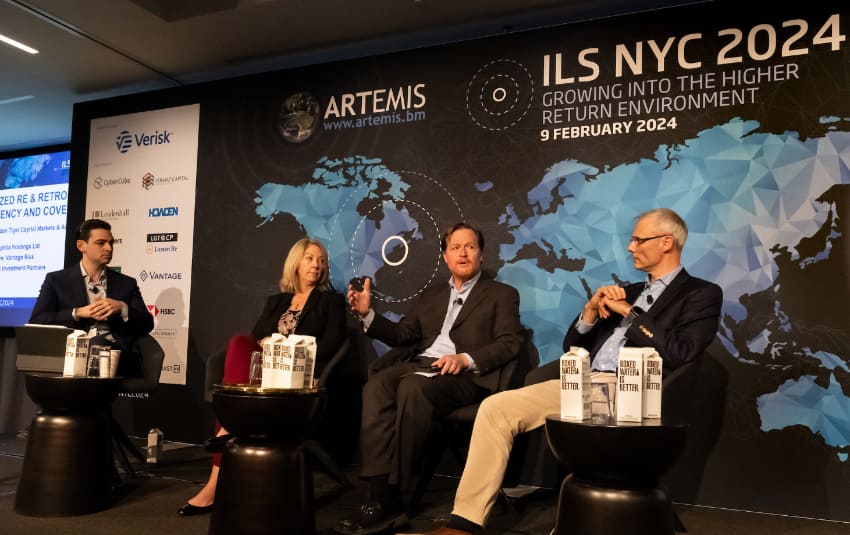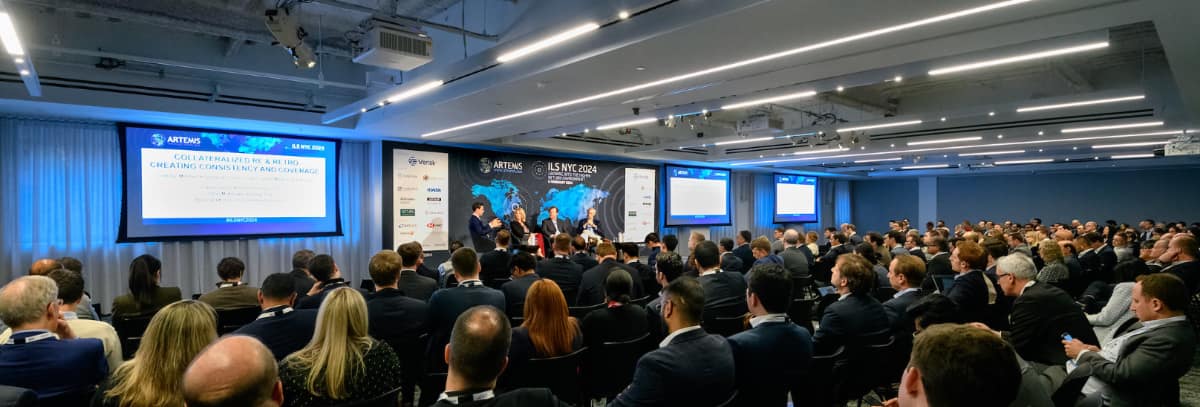Demand-driving collateralized opportunities, but clarity key: ILS NYC 2024

Insurance-linked secuities (ILS) market participants are seeing a demand-driven opportunity emerge in collateralized reinsurance and retrocession, but speakers at our recent ILS NYC 2024 conference said that while investor demand for returns from these products is rising again, the clarity of coverage terms is key.
This panel session at our ILS NYC 2024 conference on February 9th was focused on the collateralized and private side of the ILS market, with the theme of the discussion around creating consistency and providing more coverage.
The collateralized reinsurance and retrocession segment of the ILS market was the most affected by major catastrophe losses at the time the reinsurance cycle was at its softest. But since then, efforts have been taken to make the product more robust, while still delivering beneficial coverage to cedents and now more demand is being seen, on both sides.
Moderating this session, Mitchell Rosenberg, Managing Director, ILS, at Howden Tiger Capital Markets & Advisory, set the scene.
Rosenberg explained to the conference audience that, “Across the market, there’s been a general theme of capital moving up, or retrenching, whether collateralized, alternative, or balance-sheet capital.”
He went on to ask the panellists whether, because of that, “There’s an opportunity for those participating in the alternative capital space, collateralized re in general, an opportunity to fill those gaps.”
Chris McKeown, Chief Executive, Reinsurance, ILS & Innovation, at Vantage Risk noted that demand for protection continues to rise.
McKeown explained, “For us, the retrenchment, as people really focus on the pricing and the adjustments in retention in the property cat space, that certainly has happened.
“We saw demand ever-increasing and a demand-driven opportunity was presenting itself.”
McKeown went on to highlight drivers of exposure increase, such as construction levels in states like Florida, migration to catastrophe exposed areas, as well as rising climate risks, saying, “There’s a demand there that we need to acknowledge and bring more capital to bear,” and that at Vantage Risk “We started doing that.”

McKeown then said that, after hurricane Ian dislocated the market, “There was an immediate opportunity in that retrenchment to step in with significant collateralized capacity. But at the same time, taking advantage of what now we might consider more appropriate pricing for the risk and a more appropriate level of retention.
“We also thought we could accomplish a couple of other things, which is more clarity around coverage. The perpetual promise-to-pay all-perils product has got some issues with it.”
Paul Larrett, Chief Underwriting Officer, at ILS investment manager Securis Investment Partners also participated in this third panel session of the conference and discussed the interest investors are showing for the collateralised side of the ILS market right now.
“We are seeing some investors gaining confidence in the new retention levels,” Larrett explained. “They like the narrowing of the scope of cover to peak perils, investors like that cleaner product and even in the private areas we see, we offer lower-risk and higher-risk products and a lot of the money that’s coming in at the private side is kind of mirroring cat bond risk profiles.”
Larrett went on to say that, “I don’t think we should revert to being a collateralized vehicle offering coverage at a level whereby the said attachment probabilities greater than 10% or 15%.”
He further stated that, “On the loss reporting side, I think the market’s come some way in improving collateral release mechanisms.
“Obviously, trapped capital is a bad thing for an investor, suppressing IRR’s. We’ve developed, on our collateralized re and retro products, a wording that deals with essentially extension spreads. So our investors get paid about 3.5% per annum on the floating rate, for any trapped capital during the risk period and afterwards. I think that getting paid for that trapped capital will hopefully help in raising more capital into that space.”
McKeown of Vantage Risk also explained that his company has worked to relieve investors of some of the pains they had previously experienced on the collateral trapping side with its AdVantage strategy.
“In the collateralized space we need that capital back, we need to explain that and going into the market last year was a good example, we were a new entrant, we were able to achieve some structural incentives and provide some element of relief for investors, because that is a key element of investors dissatisfaction or hesitation in our business,” McKeown explained.
Before adding that, “Returns are great, the attachment level of where we sit in the risk has been part of that retrenchment, but also some of these mechanical issues have been addressed and should continue to be addressed.”
Laura Taylor, President, of Nephila Holdings Ltd. also participated in this panel discussion and highlighted the need for transparency and clarity, to rebuild investor confidence in this more private side of the ILS market.
“I think we’re at a point where even talking about softening of rate, or softening in terms and conditions, it’s not time yet,” Taylor said. “We need consistent returns coming through to the asset class, in order to demonstrate the long-term viability and profitability of the asset class.”
She added, “Right now, clarity is necessary because we’ve had surprises. So people are drawing back and moving up because of the noise and surprise, and lack of confidence that there was sufficient pricing.”
Taylor went on to comment on some of the products ILS managers used to offer, such as collateralised worldwide aggregate retro covering all perils.
“There is a world where that makes sense,” she said. “But it has to be sustainable and demonstrate that price efficiency.”
Taylor added, “I think we’re in a world right now, where very, very clear terms and conditions and very, very sufficient rate and novelty premium is where we’re at today.”
Taylor summed up, “Whether it’s the terms and conditions or the liquidity profile, the role of a fiduciary is to ensure that is adequately priced and can be demonstrated to investors over the long-term.”
We’ll bring you more coverage from the event and video / audio of every session will be available in the coming weeks.
Artemis’ next conferences will be ILS Asia 2024 in Singapore this July and Artemis London 2024 in September!
Our conferences provide exposure in front of a highly relevant, senior and specialised group of attendees. Plus you’ll benefit from exposure in front of our entire global readership, which averages more than 60,000 individuals every month.
For all enquiries regarding sponsorship opportunities for future Artemis events please contact [email protected].
Our conference sponsors for ILS NYC 2024 can be seen below. We thank them all for their valued support:

For all enquiries regarding sponsorship opportunities for future Artemis events please contact [email protected].






